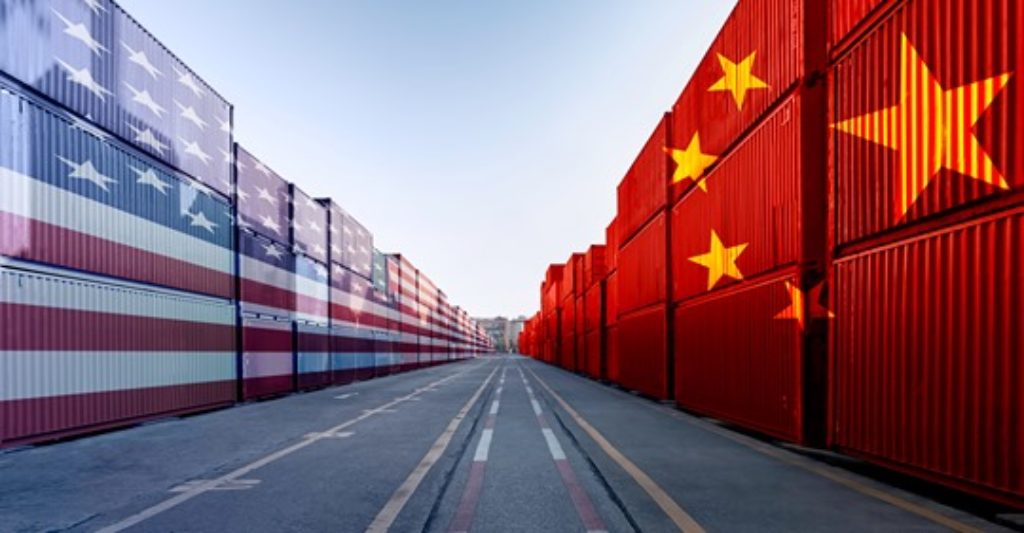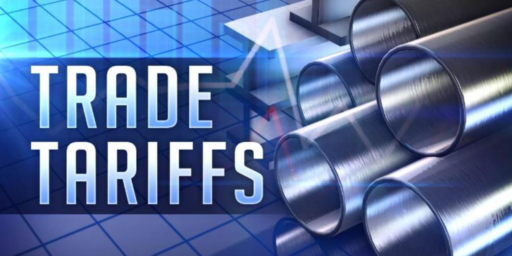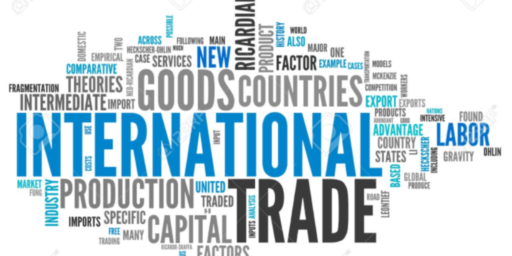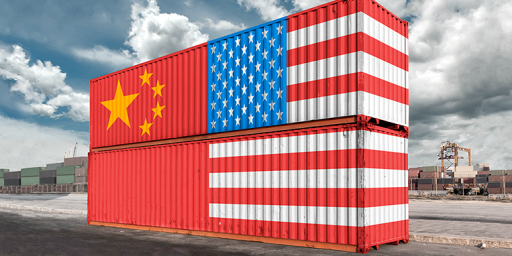Biden’s China Trade War
He's ratcheted up what Trump started but also shifted focus.

Yesterday’s episode of The Daily podcast, “How Biden Adopted Trump’s Trade War With China,” is worth a listen. The upshot is that, despite almost universal criticism of Trump’s starting a trade war with China—including from candidate Joe Biden and most of the Democratic establishment—Biden not only didn’t roll back any of it but actually escalated.
But, NYT correspondent Jim Tankersley takes great pains to argue, they’re focused differently. Trump’s was more blunt. Trump emphasized that China was eating our lunch in trade because they were cheating but, also, because prior Presidents were bad deal-makers. So, he slapped tariffs on Chinese goods pretty much across the board.
Economically, it does not appear to have achieved what Trump wanted. There’s no evidence yet in the best economic research that’s been done on this that enormous amounts of manufacturing jobs came back to the United States because of Trump’s tariffs. There was research, for example, on the tariffs on washing machines. They appear to have helped a couple thousand jobs, manufacturing jobs be created in the United States, but they also raised the price of washing machines for everybody who bought them by enough that each additional job that was created by those tariffs effectively cost consumers, like, $800,000 per job.
There’s like lots of evidence that the sectors Trump was targeting to try to help here, he didn’t. There just wasn’t a lot of employment rebound to the United States. But politically, it really worked. The tariffs were very popular. They had this effect of showing voters in those hollowed-out manufacturing areas that Trump was on their team and that he was fighting for them. Even if they didn’t see the jobs coming back, they felt like he was standing up for them.
So the research suggests this was a savvy political move by Trump. And in the process, it sort of changes the political economic landscape in both parties in the United States.
Now, I’d push back on this just a bit. While there was indeed a bipartisan elite consensus on free trade—of which I was part—going back to roughly 1945, there has been a large group of dissenters on the Democratic left since at least the early 1990s. The argument, which I’ve come to largely agree with, is that free trade only works among relative equals. When it’s rich countries trading with poor ones and democracies trading with autocracies, it creates a race to the bottom in terms of wages and working conditions.
Regardless, despite huge inflation and advice from many in his own cabinet, Biden doesn’t roll back the tariffs. But his goals are somewhat different. And, it turns out, in conflict.
Biden builds on the Trump China policy in three key ways, but he does it with a really specific goal that I just want you to keep in mind as we talk about all of this, which is that Biden isn’t just trying to beat China on everything. He’s not trying to cut a better deal. Biden is trying to beat China in a specific race to own the clean-energy future.
[…]
Thing number one — let’s talk about the tariffs. He does not roll them back. And actually, he builds on them. For years, for the most part, he just lets the tariffs be. His administration reviews them. And it’s only now, this week, when his administration is going to actually act on the tariffs. And what they’re going to do is raise some of them. They’re going to raise them on strategic green tech things, like electric vehicles, in order to make them more expensive.
And I think it’s important to know the backdrop here, which is since Biden has taken office, China has started flooding global markets with really low-cost green technologies. Solar panels, electric vehicles are the two really big ones. And Biden’s aides are terrified that those imports are going to wash over the United States and basically wipe out American automakers, solar panel manufacturers, that essentially, if Americans can just buy super-cheap stuff from China, they’re not going to buy it from American factories. Those factories are going to go out of business.
[…]
Biden isn’t just trying to reduce emissions at all costs. He wants to reduce emissions while boosting American manufacturing jobs. He doesn’t want China to get a monopoly in these areas. And he’s also, in particular, worried about the politics of lost American manufacturing jobs. So Biden does not want to just let you buy cheaper Chinese technologies, even if that means reducing emissions.
He wants to boost American manufacturing of those things to compete with China, which brings us to our second thing that Biden has done to build on Trump’s China policy, which is that Biden has started to act like the Chinese government in particular areas by showering American manufacturers with subsidies.
So, while Biden very much wants to spread green technology to combat climate change, he’s actually hindering the spread of green technology in order to protect American jobs. Further, he’s trying to build an international coalition to box China in on this front.
Some of this really is about stopping China from gaining access to new markets. It’s like, if you put the low-cost Chinese exports on a boat, and it’s going around the world, looking for a dock to stop and offload the stuff and sell it, Biden wants barriers up at every possible port. And he wants factories in those places that are competing with the Chinese.
And a crucial fact to know here is that the United States and Europe, they are behind China when it comes to clean-energy technology. The Chinese government has invested a lot more than America and Europe in building up its industrial capacity for clean energy. So America and its allies want to deny China dominance of those markets and to build up their own access to them.
[…]
[I]t’s an economic race to own these industries, and it’s that global emissions race. They also want to be bringing down fossil-fuel emissions faster than they currently are, and this is their plan.
Again, this is somewhat counterintuitive. But it’s not at all unusual. Politicians have many goals across a broad swath of areas and they are often somewhat in conflict.
With regard to China, there are national security goals, economic goals, climate goals, and domestic political goals. So, boxing out Huawei and TikTok serves security goals but comes at the cost of domestic goals, including the affordability of telecommunications and courting the youth vote. Tariffs on goods may well save jobs in related sectors but, almost by definition, increase prices for consumers. Achieving balance in these goals really depends on one’s priorities and longer-term vision.
Trump’s China policy was ill-conceived, in that its goals were dubious and likely unachievable but was popular because it was brash and spoke to real concerns across large sectors of the electorate. Biden’s is more targeted and nuanced, so less likely to resonate with voters. Whether it’s shrewd really depends on whether you support the tradeoffs.
The answer to whether it’s going to work really depends on what your goals are. And Biden and Trump have very different goals. If Trump wins the White House back, he has made very clear that his goal is to try to rip the United States trade relationship with China even more than he already has. He just wants less trade with China and more stuff of all types made in the United States that used to be made in China. That’s a very difficult goal, but it’s not Biden’s goal.
Biden’s goal is that he wants America to make more stuff in these targeted industries. And there is real skepticism from free-market economists that his industrial policies will work on that, but there’s a lot of enthusiasm for it from a new strain of Democratic economists, in particular, who believe that the only chance Biden has to make that work is by pulling all of these levers, by doing the big subsidies and by putting up the tariffs, that you have to have both the troops training and the wall around them. And if it’s going to work, he has to build on the Trump policies. And so I guess you’re asking, will it work? It may be dependent upon just how far he’s willing to go on the subsidies and the barriers.
While I actually agree with Trump and Biden that the longstanding elite consensus was wrong, I’m skeptical that either version of the new policy makes much sense. It made no sense to continue to treat China as a member in good standing of the WTO, given decades of thumbing their noses at the rules. And it may well be foolish to allow China to flood the market with cheap electric cars and the like, given that there’s no real way for American companies—who have to pay American-style wages and comply with American safety, environmental, and other regulations—to compete on price.
At the same time, it strikes me as unlikely that the United States will ever return to the level of unionized manufacturing of the postwar golden age Biden and Trump voters long for. Trade is simply more globalized now and the combination of cheaper workers in other high-education countries and replacement of people with technology would seem to preclude that. Even if we successfully box out China, the Indias and South Koreas of the world are much more likely to supply green technology than we are.





I see this as a part of a larger de-coupling, a walk-back from complete globalization to a more tentative, cautious version of globalization. There is a real possibility of war with China. Xi is diplomatically belligerent, bullying Taiwan and the Philippines militarily, trying to wrest control of the South China Sea with an eye on the Malacca Straits. Xi seems eager to start trouble, we should be equally eager to move supply lines to Mexico, Vietnam, SK and India. China is much more dependent on trade than we are, a weakness we should exploit. It does in this case mean higher prices for solar panels, which is a shame, but not enough for me to think we should deepen our dependency on China. It’s unfortunate that it’s come to this, but I think the problem is at Xi’s end, not ours.
Well, Trump was working to change the 70 years of bias and the then giddy delight in academia, media and corporate boardrooms to all things China. Trump’s tariffs forced early shifts in the Western “elite’s” China First policies. So many were already with divest from China plans when that became a more apparent necessity.
Similarly, Trump being mean to NATO countries, telling them they needed to meet their obligations if they wanted the benefit, pushed Germany and others to be less flat-footed when Putin’s invasion of Ukraine put a bit of heat under them.
I’ve heard, but not in the MSM, that there is new manufacturing building going on, but in the heavy side such as processing the minerals needed for EV batteries and developing the capacity of US refineries to process North American crude. Hardly things a Democrat in the White House can crow about if they don’t want their environmental side to go wild.
And globalization ends when the US Navy is no longer enforcing freedom of the seas. The Suez canal is throttled now, with the attacks extending into the Gulf of Aden. Seems like the problem is being left to the Indian, French and British navies.
The problem with that analysis is that tariffs are a very blunt instrument. Blunt instruments have blunt effects regardless of your intended goals, and I highly doubt China is going to care much about any nuance in Biden’s expansion on top of Trump’s tariff regime, which Biden did not get rid of.
Like you, I support free trade. The problem is that we haven’t had it. China has been playing mercantilism, and we haven’t, or haven’t as effectively, and now we are trying to play catch-up using the international trade version of chemotherapy—meaning it’s going to hurt us as well as them.
I support free trade, but we need a policy of reciprocity to make it work. China is no longer a developing nation, and if it wants access to our markets, it has to give us access to theirs. Is there a strategy here to achieve that? Let’s hope so.
Edited to add:
Also I agree with Michael above – this is probably a necessary pain on the road to decoupling.
@Andy: It’s more than just access to their markets. Every company of any size there has an equal partner to the CEO/President who is literally appointed by the government. That’s official. Something else that is true but unacknowledged, every successful business eventually has a member of one or more government officials’ family as a major shareholder, with the shares just showing up in their pocket. The family member works with the government to promote the company’s interests at home and abroad. Another reality: the Chinese Government has a vast enterprise of corporate espionage, which they deploy against anyone of interest to Chinese companies, and actively shop the various data they gather to their own manufacturers.
On top of that, China is a colonial power. We were willing to ignore that when it was limited to poor countries, but but then they staked claim to the entire South China Sea and are now sending gun boats out to seize ships they have decided are trespassing on their territory. And of course, they are regularly harassing Taiwan, vitally important to our manufacturing base, with jet fighters, war ships and more subtle forms of warfare.
Treating this as just a trade dispute is hopelessly naive.
@MarkedMan:
Highlighting for emphasis, because I was going to point this out. Perhaps we need something like an embargo for any Chinese products using stolen technology.
@JKB: I told my Trump-voting friends long ago that his China policies might actually be the right general direction for once. Given his limited IQ and knowledge, I assumed the idea came from advisers and of course was implemented ham-handedly.
@MarkedMan:
I agree that our problems with China are not just a trade dispute.
The post was on trade, however, and the tariffs are ostensibly about trade. If they are part of some bigger plan to stem all the bad things that China is doing, then great. I would like to see policies and regulations that specifically address some of the items you mention.
At the same, we do need to be careful about effects, or at least be able to anticipate and prepare for them.
@Andy: I honestly think the biggest effect we have to worry about is an irrational and unhinged China as it tries to manage a shrinking economy. Just wait until they start limiting travel permits, preventing people from studying or seeking work abroad. Manufacturing a war is always a sure way to distract the population
Sorry, category error. It’s impossible to “agree with Trump” because Trump does not have positions that one could agree or disagree with. He just says things. It’s not the same.
It is, on the other hand, possible to disagree with Biden. He says things that mean things, and stands by them — and one could sensibly disagree.
An interesting aspect: in some respects the Biden Administration is calling China’s bluff on photovoltaics, batteries etc.
China appears to have bet that it can subsidise, via cheap capital diverted from (effectively) forced savings at very low rates of return, and state export credits to cover “dumping” etc to destroy effective scale competition. As it has in other sectors in the past.
The combination of these production/export aids and European solar installation subsidies (but with no internal purchase requirement due to EU competition law) has had devastating effects on European photovoltaic production.
However, the pattern in other sectors has tended to be, as competition is marginalised, China is able to taper subsidy and increase prices enough for them to be viable long term, while still cheap enough to prevent renewed ” first world” competition.
If the US (and, pretty certainly, the EU) impose tariffs and operate internal subsidy regimes, that makes much harder for China to switch to a “break even” mode.
The outcome: China squeezes its own citizens living standards (via forced savings at low returns, supressed wages, supressed consumption, etc) in order to subsidise the US and European goal of proliferating solar power cheaply and on a massive scale across the “global South”.
And such things have opportunity costs: while China is doing so, it is diverting capital and capacity from other fields.
@MarkedMan:
That’s the thing I’m most concerned about. I look back on Japan’s decision to go to war with the US and see enough parallels for concern.